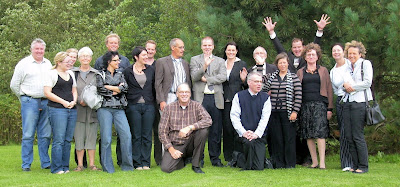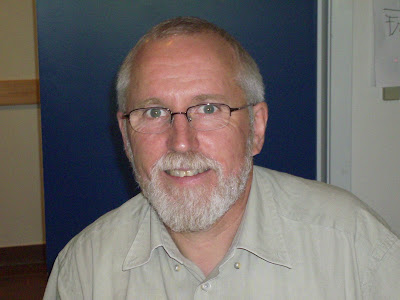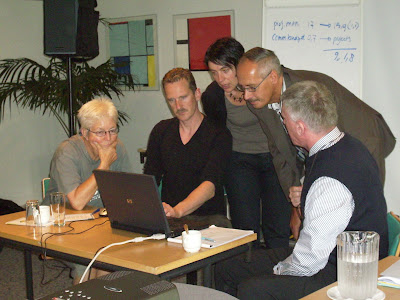Vejen, DK. For the fifth time in 18 months, representatives of six countries and twelve regions and institutions have met, to discuss their project 'Virtual Rural Areas'. This initiative for an Interreg IVB project has gained momentum with each consecutive meeting. I have been able to attend the appointments in Dokkum, Kortrijk and Husum.
 |
| Group portrait at Vejen. |
Interreg IVB: that is the European finance programme for the North Sea region. Of course, previously there have been comparable programmes, numbered one till three. Our province of Fryslân has been participating in various degrees. The municipality of Dantumadeel is a newcomer in Interreg, but it has acquiered international experience with its project 'E-Voice'. Now, it was time for the next stage.
To me, the best thing about this particular project is the enhanced ambition level of the North East Frisian municipalities, known in short as NOFA. Normally, the inhabitants of this region are rather conservative. They are not used to being adventurous or innovative. It is largely on account of the perseverance and enthousiasm of municipal secretary Eise van der Sluis and his team that NOFA has come this far.
Even after five meetings in various parts of Europe and a lot of planning, talks, thinking and scheming nearly all initial partners are still in the project. Better even, they are determined to continue.
 |
| Meeting Room at Vejen Kongress Hotel. |
During the preparation stage, some new partners have joined the project.
One of them, the Danish Vejen Kommune (Mid-Jylland, halfway between Esbjerg and Kolding), played host to this meeting. Early in 2008, I had contacts with Søren Dejgaard from Copenhagen. He had learned about our company Nijfinster, through a presentation about virtual home care on TV that I had given at the IANIS+ annual conference 2006 in Blekinge, Sweden. I have to thank the province of Fryslân again for inviting me along for that event.
Dejgaard was working with different aspects of broadband usage. He found it very interesting how we had used broadband in the social sector as a medium for home care. Søren connected me to Simon Simonsen from Vejen. Simon had played an important role in the realisation of the customer owned Fiber to the Home project in Vejen Kommune. This network is an 'open network' in the new sense of the term: digital services on the network may be provided by various competing parties. In this model, the development of services and applications will become less dependent on short term business case considerations; innovation and long term marketing are supposed to be the leading principles. At the Frisian conference on Digital Services in 2006 Nigel Matson gave some very interesting comments on this subject. At some other time I'd like to discuss his views further.
 |
| Simon Simonsen. |
Simon was really interested in the way that we Frisians try to develop new broadband and ICT applications, as a means to enhance the quality of living in our rural area. His new fiber network was continuously searching for new 'content'. Exchange of views, technology and expertise between Denmark and Fryslân seemed a good idea to both of us. I suggested Simon to step into the Virtual Rural Area Project and that is exactly how it turned out in the end.
To make a long story short, the Vejen Kommune played host to a very successful meeting of the international partners. Personally, meeting all of them them again was very enjoyable to me. The ladies from Rogaland en Finnoy (Norway) and Langenhagen (Germany), the Flemish contingent, new faces from Norfolk, the NOFA crew, Martijn Ledegang from the Province of Fryslân, Jan Walburg of course as European funding expert. Last but not least Ytty Goris from ROC Friese Poort and Sicco Boorsma, who were passengers in my car for the long 650 km trek to Vejen.
 |
| Ytty & Sicco, my travel companions |
It got really exciting halfway the meeting. The total budget of VRA seemed to exceed the amount that was considered reasonable by the Viborg secretariat of Interreg IVB. It was necessary to cut regional budgets. The Flemish Leijedal region had not even been allocated any funding, so for them provisions had to be made too. Of course not everybody was happy with losing funding for their plans.
 |
| Tension and discussion while figuring out the budget structure |
The Lead Partner NOFA had to do a lot of strategic and political massaging. Every region had a multitude of reasons not to be curtailed in its budget. In the end, I decided to give up my partnership in this project. Kabel Noord as a cable operator is a private business, we were looking more and more out of place in this community of governmental representatives. The cofinancing of 80 thousand euros I had promised looked very diminutive, compared to the tons and millions of some others. From my viewpoint though it was a large amount of money and I expected a real challenge to 'sell' this idea to my colleagues at home.
Why then should Kabel Noord not partner? Well, NOFA could at least transfer my € 80.000 of co-financing to Leijedal, a region that did not exactly got a good deal up till then. Also, we could keep the money in our pocket. But most important - and now I'm being quite honest - I figured that I could still be helping the project VRA to proceed, by offering our technical and procedural expertise and knowledge on ICT and broadband, E-care and E-health, E-learning and E-government. I had a nice message to take home for my company colleagues: there might be business ahead without the financial partner commitment.
But yes, it's sad that we have lost responsibility and voting privileges in this project. We have put a lot of time, energy, money and even emotion in the concepting phase of VRA. Now the most important issue still has to be decided upon: will the Viborg secretariat be positive about the NOFA initiative?
More pics of the meeting
Dutch version of this posting
Pics: Gijs van Hesteren


Geen opmerkingen:
Een reactie posten